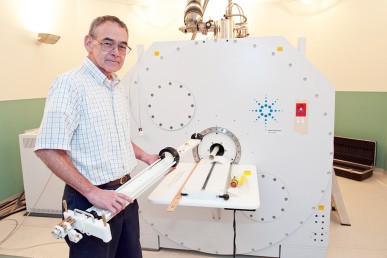MRI system a powerful tool for bioengineering research

“Most researchers have had to do their MRI work elsewhere,” says bioengineering professor Richard Magin, lead investigator in a $2 million grant for a powerful MRI system. Photo: Roberta Dupuis-Devlin/UIC Photo Services
By Paul Francuch
UIC has a powerful new research tool: a 9.4 Tesla magnetic resonance imaging system that helps engineers and scientists study a range of bioengineering problems.
The MRI, located in the Clinical Science North building, is dedicated to animal research.
“There’s real glee to have this capability right here,” said bioengineering professor Richard Magin, lead investigator in a $2 million National Science Foundation grant to purchase the new MRI.
UIC will match $1 million to operate and manage the instrument through the Research Resources Center.
“Most researchers have had to do MRI work elsewhere,” Magin said. “They didn’t have the animal capability on this campus. Now our students and faculty can do their work here on a daily basis.”
A team of investigators at UIC and the Illinois Institute of Technology was awarded an NSF grant to buy the versatile MRI manufactured by Agilent Technologies.
Other campus MRI systems designed primarily for human or primate research were either not available, unsuitable or too expensive to handle the bioengineering tasks and research problems that the new system will tackle.
Laboratory animals used for study will be housed in UIC’s adjacent Biologic Resources Laboratory, so animal transport will be quick and indoors, minimizing exposure to cold or heat.
“With any kind of disease that can be modeled in an animal and established in a clinical-like protocol for evaluating therapy, the investigator would like to have a noninvasive way of getting a quantitative measure of function or structure,” Magin said. “MRI is a tool that can do that.
“This allows us to do experiments faster,” he added. “If you’re looking at something like a beating heart, it allows you to take images in a fraction of a second and allows you to stop the action.”
Projects already planned will study biomedical problems ranging from control of tumor growth to bioengineering effective cellular-level scaffolding to support and help control stem cells, used for growing new tissue to restore damaged bones, teeth and organs.
Having 24/7 access to this powerful MRI will give researchers clearer, faster images of what’s going on in an animal body that’s affected by disease.
It should enable more dynamic monitoring of changes, which will allow researchers to better tailor experiments when problems are detected early.
“It helps shorten the time between improvements in the research, and that speeds our publications and proposals,” Magin said.
Researchers in various fields on campus will have access to the new MRI and students will have the opportunity to learn its operation and research capabilities. Weiguo Li, the facility’s new director, is organizing workshops and training sessions for new researchers.
Other principal investigators on the NSF grant include faculty members Michael Ragozzino, psychology; Karl Rockne, civil and materials engineering; Thomas Royston, bioengineering; Dan Schonfeld, electrical and computer engineering; Belinda Akpa, chemical engineering; Noam Alperin, medical physics; Joanna Burdette, biopharmaceutical sciences; Daniel Corcos, kinesiology and nutrition; Jeffrey Fortman, Biologic Resources Laboratory; and William Hendrickson, microbiology and immunology.
IIT investigators include Konstantinos Arfanakis and Vincent Turitto in biomedical engineering and Miles Wernick, director of the university’s Medical Imaging Research Center.
